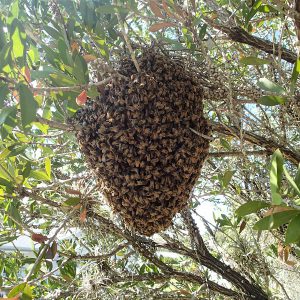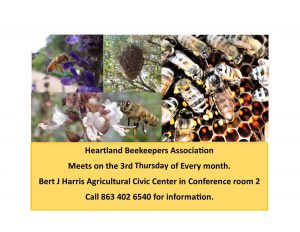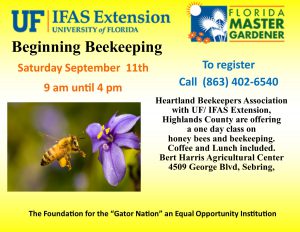Protecting the bees
Everyone is worried about the bees. Since colony collapse started being recognized as an issue in 2007, the word is out that bees may be in trouble. Yet, and maybe because of, there are more beekeepers than ever. Florida has over 5,000 registered beekeepers. That has steadily increased over the last few years. 3 out of 4 of the beekeepers are considered backyard beekeepers with less than 10 colonies. The news is good but long-time beekeepers will tell you the rules have changed. Pest like Varroa destructor, a mite that feeds on honey bees and their larvae and often weakens the whole hive, has increased the difficulty of beekeeping. Still, backyard beekeeping, with the allure of harvesting golden honey, keeps the dream alive.
Abundant feral bees
Where I reside, in the Heartland of Florida, honey bees are quite abundant. The reason is we sit in the heart of the citrus country. Every year, northern beekeepers bring down thousands of hives to enjoy the fruits of the honey bee’s labor. The massive nectar flow from citrus flowers brings an abundance of the premium sought-after orange blossom honey. Unlike almonds, which require bees for pollination, most citrus varieties are self-pollinating. The beekeepers are the ones that reap the most benefits and they are eager to get a spot near the citrus groves.
Free Bees?

Coincidentally, when the bees are brought to gather orange blossom nectar, is also when the spring swarming is at full tilt. Swarming is a natural occurrence whereas the queen leaves the hive with a large portion of the flying bees and goes to find a new home. Swarms can be found hanging in about any location and are not aggressive since they are not defending their hive. While hanging in a ball or clump, scout bees undertake the task of looking for the new location. The result is plenty of feral or escaped colonies for wannabee beekeepers to gather and put in their own hive boxes. To learn about honey bee swarming, click here to watch this short movie clip.
The lure of sweet success
For me, it was the love of honey that drove me forward. Everyone has their switch. One gentleman, whose wife wanted to try beekeeping, wasn’t so thrilled with the idea. It wasn’t long before he bought himself a suit and took over the endeavor. Like everything, there is work involved. If you’re like me, when the first crop of honey comes in, you’ll be finding yourself wanting more.
Finding help
Fortunately, the Heartland Beekeepers Association, based in Sebring, is here for new beekeepers’ support. Seasoned beekeepers and backyard beekeepers gather together at 7 pm on the 3rd Thursday of every month at the Bert J Harris Jr Agriculture Civic Center for their meetings. They trade stories and ideas on taking care of their honey bees. Not everyone in the group is a beekeeper. Some come to learn and still, others are intent on getting started but haven’t made the jump. Annually, a beekeeping course is offered, to train new beekeepers, in the finer details of the craft. This year the course is Saturday, September 11th from 9am until 3pm and includes lunch. For information on taking the class and on how to register, click here, email me at davidaustin@ufl.edu or call the extension office at (863)402-6540)
That’s what’s new from the Hometown Gardener. Like and Follow me on Facebook at Hometown Gardener.
Stay in touch!
In Highlands County, our office is at 4509 W George Blvd., Sebring. The Master Gardener Help Desk is open Monday – Friday from 9:30 AM to 3:30 PM.
Sign up for our Highlands County Master Gardener Volunteer, “Putting Down Root” Newsletter Here.
Read my other blogs by clicking here.
Join our Facebook groups: Highlands County Master Gardeners, Central Florida Butterfly and Pollinator Club, Science-Based Florida Gardening Answers, and Heartland Beekeepers.


 0
0
